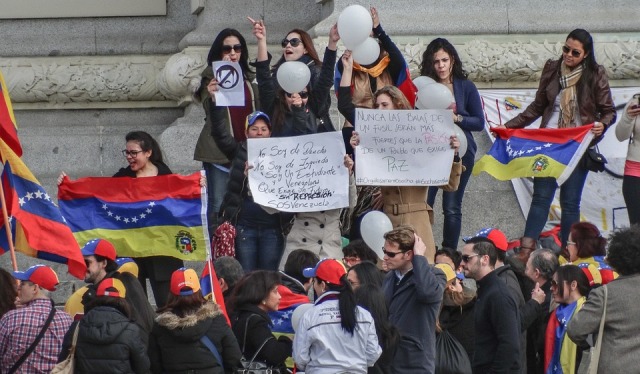It’s been a while since I’ve written about Venezuela; though I follow the news every day. Bread lines turning into “Brownie Wars”. A starving nation sending “flood relief” to Peru, echoing the days when Idi Amin sent food to Britain – although the Venezuelan government doesn’t know that. Banana Republics tend to “rhyme”; following the only poems written at the end – those by politicians.
A life free from politics – that’s what the Venezuelans want now. For a time, when Hugo Chavez swaggered over the mountains and through the valleys the people surged behind him like a wave, filling cracks and crevices and holes. The revolution was everywhere – t-shirts and banners and marches. Red, a red tide inundating the nation. For the poor, the people in makeshift orange-brick houses clinging to the side of hills it must have felt a tremendous vindication; after so long in obscurity.
“Socialism or Death”. Turns out they got both. Turns out “participating” when you’re told, where you’re told, how you’re told really isn’t participation at all. Its enslavement with energy; servitude with verve. “It is true that the virtues which are less esteemed and practiced now–independence, self-reliance, and the willingness to bear risks, the readiness to back one’s own conviction against a majority, and the willingness to voluntary cooperation with one’s neighbors–are essentially those on which the individualist society rests. Collectivism has nothing to put in their place, and in so far as it already has destroyed then it has left a void filled by nothing but the demand for obedience and the compulsion of the individual to what is collectively decided to be good,” as Friedrich Hayek puts it.
To be sure, it is true that they remember the heady days of Hugo Chavez with nostalgia – when they had both the power and the money; the marches followed by free beer and food. But those days are gone – they did not prove sustainable, and the revolutionaries are left with only that last slow death march of a bread line. Most do not know what happened – we who have been the caretakers of wisdom were unable to make the case for classical ideas of liberty that do abide; shouting over Hugo proved impossible. And the “They didn’t do it right” crowd is already busy making their case – Leopoldo Lopez reading Piketty from jail, his wife Lilian emphatically defending his party’s membership in the Internacional Socialista; as if it wasn’t the Internacional Socialista that threw her husband in jail.
Sigh – people sure do love their captors, don’t they?
But I digress.

The politics has become for Venezuelans like an albatross; and folks are looking back to remember what it was like before with lamentations. Days at the beach. Parties in their humble homes – to be sure they might not have had black label whiskey, but they did have beer. They might not have had imported salmon but they did have pernil and cachitos and arepas. But more than that they remember when their nation still had a soul – brotherly love to a measure – the pride in a beautiful country that didn’t come from its political prominence but from good baseball and beautiful Miss Universe contestants and lovely scenery; from the freedom of life lived for family and get-togethers and religious festivals that existed independent of the politics of the season.
That’s the reason that we fight the socialism so much – that political ideology demands a monopoly on national life. It is in the shower with you, in your cereal in the morning and in your soup at night. It demands subservience; it demands thought and focus and action; it demands attention – even when your intention is to fight it. Venezuela learned this – and deconstructing the mess is proving to be hard. Totalitarian regimes have a reach that is not only broad but deep. Don’t believe me; ask Yeonmi Park.
Venezuela will never again be the land that she was in the ‘80s; most people are coming to terms with that now. Just like a Cuba free from the Castros will be a fundamentally different place – Venezuela free from the Bolivarians will be sadder, more guarded, more suspicious. It is only natural – everybody after they are assaulted is left with scars that are unseen; and the damage upon the psyche is irreversible.
And the ongoing assault by the Bolivarians has been bloodcurdling indeed.


Pingback: Venezuela After the Politics | Joel D. Hirst’s Blog | teddymcnabb
Reblogged this on teddymcnabb.
LikeLike
Thank you.
LikeLike
Thanks for letting people know what is really going on in Venezuela and for not letting forget about our situation
LikeLike
Pingback: Socialism Fails Because All It Ever Leads To Is Death « Amerika